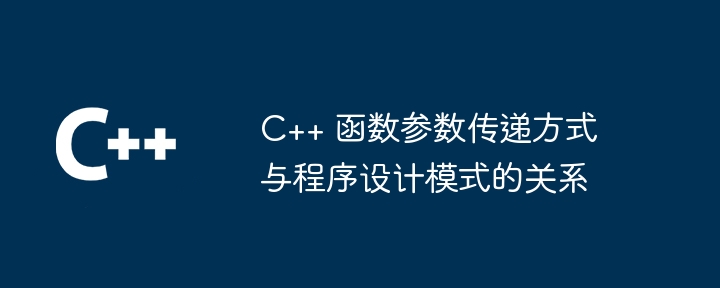
The function parameter passing method in C is closely related to the programming mode. Different passing methods will affect function behavior and mode selection. Passing variables by value is suitable for immutable objects or objects with high copy costs. Pass by reference to directly manipulate variables, suitable for input and output parameters, large objects and observer patterns. Passing by pointer allows handling of dynamic data structures and NULL pointers. When choosing a delivery method, you should consider object characteristics, functional operations, and programming patterns to achieve efficiency and design goals.

C The relationship between function parameter passing method and programming mode
In C, function parameters can be by value or by reference Or passed by pointer. Different delivery methods affect function behavior, memory usage, and programming pattern choices.
Transmission method
Programming Pattern
The transfer method is closely related to the programming pattern:
Pass by value:
Pass by reference:
Pass by pointer:
Practical case
Consider the following function, which exchanges two integers:
void swap_by_value(int a, int b)
{
int tmp = a;
a = b;
b = tmp;
}
void swap_by_reference(int& a, int& b)
{
int tmp = a;
a = b;
b = tmp;
}Pass by value (swap_by_value)
Pass by reference (swap_by_reference)
Usage considerations
If two large integers are passed when calling the swap_by_value function, unnecessary copying will occur operate. Conversely, if you are passing an immutable string, passing by value is more efficient.
The above is the detailed content of The relationship between C++ function parameter passing methods and programming patterns. For more information, please follow other related articles on the PHP Chinese website!
 What are the differences between c++ and c language
What are the differences between c++ and c language
 Recommended learning order for c++ and python
Recommended learning order for c++ and python
 Cost-effectiveness analysis of learning python and c++
Cost-effectiveness analysis of learning python and c++
 Is c language the same as c++?
Is c language the same as c++?
 Which is better to learn first, c language or c++?
Which is better to learn first, c language or c++?
 The difference and connection between c language and c++
The difference and connection between c language and c++
 C++ software Chinese change tutorial
C++ software Chinese change tutorial
 Cost-effectiveness analysis of learning python, java and c++
Cost-effectiveness analysis of learning python, java and c++




